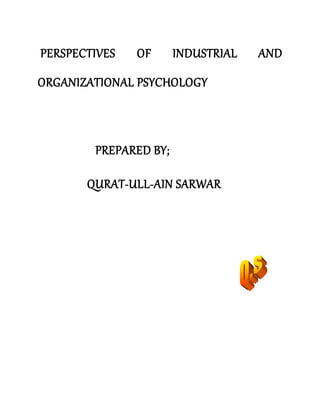
Perspectives of industrial and organizational
- 1. PERSPECTIVES OF INDUSTRIAL AND ORGANIZATIONAL PSYCHOLOGY PREPARED BY; QURAT-ULL-AIN SARWAR
- 2. PERSPECTVES OF INDUSTRIAL/ORGANIZATIONALPSYCHOLOGY PERSPECTIVE; A point of view, a particular way of considering something, and to think about a situation or problem in a wise and reasonable way. PSYCHOLOGY; Psychology is the scientific study of mental process and behavior. INDUSTRIAL PSYCHOLOGY; Industry is a division in which processing of raw materials and manufacturing and trade of goods take place. Industrial psychology looks at behavior that occurs within the work place. ORAGANIZATIONAL PSYCHOLOGY; Organization is a group of people who work interdependently towards some purpose. Organizational psychology is the scientific study of employees, workplaces, and organizations. INDUSTRIAL/ORGANIZATIONAL PSYCHOLOGY; I/O psychology is concerned with understanding human skills and abilities, how they change and develop over time, and how they impact behaviors in organizational settings. It is the usage of psychological principles and theories to the workplace. PERSPECTIVES OF I/O PSYCHOLOGY; The perspectives of industrial and organizational psychology; as the definition of I/O psychology says it is the usage of psychological principles and theories to the workplace, so it include motivation theories nor the perspectives like psychoanalytic, humanistic, behavioral, biological and others. Motivational theories in I/O psychology are used for the motivation of employees. Within organizational psychology, the study of employee motivation represents one of the most important topics in the disciplines. These motivation theories actually determine the perspectives of I/O psychology. o Motivational theories I. Need based theories
- 3. II. Job based theories III. Cognitive process theories IV. Reinforcement theories REINFORCEMENT THEORY (THE BEHAVIORAL APPROACH) INTODUCTION; o Reinforcement is defined as anything that causes a certain behaviors to be repeated or inhibited. o Reinforcement theory is simply looks at the relationship between behavior and its consequences. CONTRIBUTIONS: Modern reinforcement theory can be traced to Thorndike’s (1898) discussion of animal behavior, although many others have contributed to its development like; Hull, Skinner and Tolman. EDWARD THORNDIKE’S REINFORCEMENT THEORY; Edward Thorndike (1898) is famous in psychology for his work on learning theory that lead to the development of operant conditioning within Behaviorism. Experiment; Thorndike studied learning in animals (usually cats). He devised a classic experiment in which he used a puzzle box to empirically test the laws of learning. He placed a cat in the puzzle box, which was encourage to escape to reach a scrap of fish placed outside. Thorndike would put a cat into the box and time how long it took to escape. The cats experimented with different ways to escape the puzzle box and reach the fish. Eventually they would stumble upon the lever which opened the cage. When it had escaped it was put in again, and once more the time it took to escape was noted. In successive trials the cats would learn that pressing the lever would have favorable consequences and they would adopt this behavior, becoming increasingly quick at pressing the lever. Edward Thorndike put forward a “Law of effect” which stated that any behavior that is followed by pleasant consequences is likely to be repeated, and any behavior followed by unpleasant consequences is likely to be stopped.
- 4. THORNDIKE’S PUZZLE BOX Thorndike (1905) introduced the concept of reinforcement and was the first to apply psychological principles to the area of learning. His research led to many theories and laws of learning, such as operant conditioning. B.F SKINNER’S REINFORCEMENT THEORY; Indeed, Skinner's theory of operant conditioning is built on the ideas of Edward Thorndike. Skinner (1938), like Thorndike, put animals in boxes and observed them to see what they were able to learn. Skinner proposes that the consequences of behavior will motivate employees to behave in pre-determined ways.
- 5. HULL’S REINFORCEMENT THEORY; The learning theories of Thorndike and Pavlov were later synthesized by Hull (1935). The DRIVE REDUCTION THEORY created by Behaviorist Clark Hull to explain behavior, learning and motivation. In this theory he emphasized on Biological needs. Basic concept’s in Hull’s theory was; Need- physiological imbalances Drive- state of tension Reinforcement-reward (primary and secondary) Goal- commodity which reduce drive. According to Hull physiological need creates an aroused tension state (a drive) that motivates organism to satisfy the need. TOLMAN’S REINFORCEMENT THEORY; According to Tolman’s theory of sign learning, an organism learns by pursuing signs to a goal, i.e., learning is acquired through meaningful behavior. Tolman emphasized the organized aspect of learning. Tolman (1932) proposed five types of learning: (1) approach learning, (2) escape learning, (3) avoidance learning, (4) choice-point learning, and (5) latent learning. All forms of learning depend upon means-end readiness.
- 6. SCHEDULES OF REINFORCEMENT: o Continuous reinforcement i. Each and every desirable behavior is reinforced. o Intermittent reinforcement I. Time based schedules a. Fixed interval b. Variable interval II. Output based schedules a. Fixed ratio b. Variable ratio EXAMPLE FOR APPLYING REINFORCEMENT STARTEGIES ORGANIZATION BEHAVIORAL MODIFICATION; In organizations the application of behaviorism is known as Organizational Behavior Modification (OBM). This approach has been used to influence a number of behaviors, such as safety, suggestive selling and production efficiency. Reinforcement modification is a technique, based on the reinforcement theory, can be used to change people’s action by changing their outcomes. Theoretically, any of the motivational process can be used to modify behavior.
